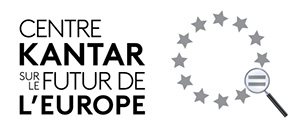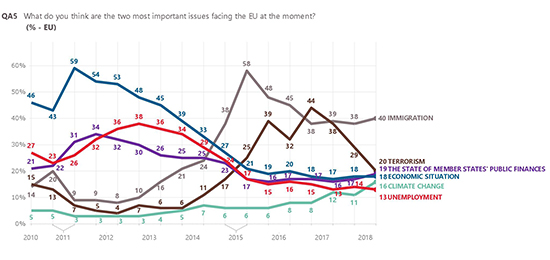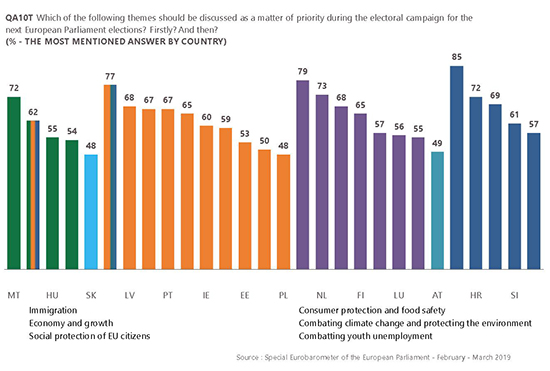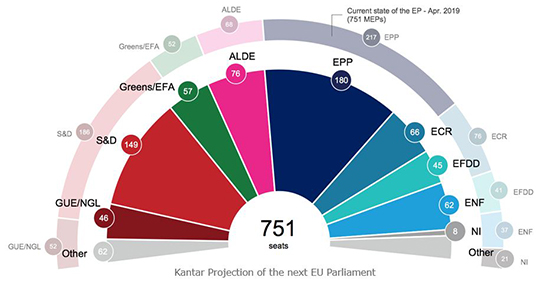Democracy and citizenship
Emmanuel Rivière,
Julien Zalc
-

Available versions :
EN
Emmanuel Rivière
Julien Zalc

1) The 2019 European elections: a different context from that of 2014
Eurobarometer data[1] highlights the economic nature of the concerns of Europe's citizens, in the same way they were concerned during the renewal of the European Parliament in 2014. Indeed, when they were asked in autumn 2013 to identify two of the most important issues the European Union faced at the time, Europeans selected the economic situation (45%), unemployment (36%) and the state of public finance (26%). Five years later, this leading trio has been overturned, making way for immigration (40%), in first place, according to Eurobarometer[2], whilst this theme was only fourth at the end of 2013 (16%). Then comes terrorism (20%), which ranks quite high, due to the emotional weight it holds, but it is also a trend that decreases rapidly when there are no attacks on European soil, and finally the state of public finances (19%). It is also important to note the progressive breakthrough of the question of climate change in European awareness, selected by 16% of citizens, makes the latter the fifth issue that the Union faces according to European opinion.
Economic concerns were relegated to a lower position, since the relative recovery of the Member States' economies over the last five years, the migratory crisis of 2015 and even the progressive awareness of public opinion of environmental issues seem to explain this phenomenon. However, the latter did not just suddenly appear. Indeed, European concern regarding the Union's economic situation peaked mid-recession in 2011 and has constantly declined. However, it is important to stress that the economic situation continues to worry the populations in the Member States which were strongly affected by the crisis. In 2018, for 27% of the Greeks and Italians, 25% of the Spanish and even 22% of the Cypriots, this issue is one of the Union's most important, with the average amongst all European citizens lying at 18%
The same trend can also be seen regarding unemployment and public finances, in 2013 for the former, and as of 2012, for the latter. However, we should note that concern about the State budget is not the same across all of Europe. Indeed in 2018 the state of government finance continues to capture public attention in the Union's most prosperous states, such as Austria (28%), Germany (30%) and the Netherlands (34%).
Regarding extra-economic concerns, one of them, immigration, started to rise in 2013, with an extremely sharp rise occurring in 2015. As for climate change, it developed at a slower place and more progressively between 2011 and 2017, when there was a leap in European public opinion in this regard.

Understanding the reasons for the rise in immigration and climate change in European awareness demands a closer examination of the progression of these political issues in the Member States. Firstly, we note a rise in concern about the former between 2013 and 2018 in the countries of Central and Eastern Europe. As an example, only 10% of Hungarians, 9% of Poles and 13% of Czechs identified this question as one of the two most important in the Union in 2013. Respectively by the autumn of 2018 their numbers had risen to 54%, 43% and 58% about this. Moreover, we can also see that this trend has gathered pace significantly in the countries that were highly affected by the economic crisis, like Greece (15% before the elections in 2014; 44% in 2018), Ireland (8% before 2014; 32% in 2018) and Spain (8% before 2014; 38% in 2018).
Moreover, climate change has also become a priority to varying degrees in Europe. Beyond the significant rise in concern about this in the countries that are traditionally motivated by it, like in Sweden (21% in 2014; 46% in 2018), Finland (11% before 2014; 36% in 2018) and Germany (7% before 2014; 21% in 2018), we note a significant leap in awareness in countries like France (4% before 2014; 22% in 2018), Ireland (2% before 2014; 27% in 2018) and Belgium (4% before 2014; 26% in 2018). Moreover, the rise in European awareness of climate change as one of the Union's two main problems can also be attributed to the fact that the countries which experienced severe economic recession, and which are not traditionally key Union States in this regard have progressively begun to address the issue. Hence this applies to Italy (1% before 2014; 11% in 2018), Cyprus (2% before 2014; 12% in 2018) and Spain (2% before 2014; 10% in 2018).
2) A multitude of shared issues, different hierarchies according to the States
The comparison between 2013 and 2018 of problems that the Union faces, according to European citizens, illustrates a change in context. To be more precise data from the Special Eurobarometer of the European Parliament conducted in March 2019[3] highlight the themes that will set the pace of what Europeans want in the campaign for the European elections of May 2019.

A wish to discuss themes that they really care about: Europeans seem to consider the European elections as a means to change situations
When they are asked which themes, they want addressed as a priority during the electoral campaign in the next European elections logically we find in their answers issues that citizens really care about. Immediately obvious is the strength with which the various issues are mentioned: five issues are quoted by more than 40% of those interviewed: growth and the economy (50%), youth unemployment (49%), immigration (44%), climate change and the protection of the environment (43%), as well as the fight to counter terrorism (41%). The fact that those interviewed were only able to give six answers in all, helps to explain these high percentages, these figures also reveal strong demand on the part of European citizens for in-depth and varied debate during the electoral campaign. And this expectation tells us something about the way they perceive these elections: not just as a means to express their feelings for or against Europe, for which this ballot is sometimes incorrectly earmarked, but as a means to bring issues, which are important in their opinion, up for debate.
The economy and a Europe that protects, on the rise, articulate around immigration and the protection of the borders, on the decline
If we explore the answers in detail, economic issues are at the top of the list: economy, growth take the lead, mentioned by one European in two, just ahead of the fight to counter youth unemployment (49%). A year before the election in April 2018, growth and the economy were only in fourth position. Immigration came third, although it has decreased in comparison with the previous survey of September 2018, when it led the ranking (44%, -6 percentage points). We should also note that the protection of the external borders is also one of the three themes out of twelve that have regressed since September 2018 (24%, -3). As for climate change, it ranks increasingly high, carried along by youth movements everywhere in Europe: it has risen from fifth to fourth place (43%, +3), and is even the first answer in some countries and amongst certain categories of the population.
Secondly, five areas are quoted by 30% to 40% of those interviewed, with for each of these a small increase in comparison with September. It is notably the case with the social protection of European citizens (35%, +3), consumer protection and food safety (30%, +3) and the security and defence policy (30%, +2): the demand for a Europe that protects is strong and it is rising.
Quite strong differences between Member States
The analysis of national results shows quite strong variations from one country to another.
The economy and growth are the first response quoted in nine countries - two of them in the Mediterranean - Cyprus (on an equal footing with the fight to counter youth unemployment) and Portugal - three Baltic States, Latvia, Lithuania and Estonia, three countries in Central and Eastern countries (Poland, Romania, Bulgaria) and Ireland.
The fight to counter climate change and to protect the environment is in the lead position amongst the Union's richest countries: Sweden, Denmark and Finland, the Benelux countries (Belgium, Luxembourg and the Netherlands) and German.
The fight to counter youth unemployment leads in countries that suffered the 2008 crisis very severely, in Greece and Spain, where youth unemployment is still over 30%[4], but also in France, Croatia and Slovenia.
As for the security and defence policy it appears in the first six campaign themes selected by the citizens in seven EU Member States. On closer observation we note that six of them are in close geographical proximity with Russia, i.e. Finland, Estonia, Poland, Latvia, Hungary and Lithuania.
In Malta and Italy (two countries which are the first port of call for migrant arrivals), as well as Hungary and the Czech Republic, whose governments have made the fight to counter immigration one of their battle horses, immigration is in the lead. In Italy this theme is quoted equally alongside the economy and growth and also youth unemployment.
Finally, the Slovakians place consumer protection and food safety in the lead, whilst the Austrians opt for greater social protection.
We note therefore, and quite logically, citizens' expectations regarding the themes to be discussed during the campaign vary quite strongly from one country to another, depending notably on the main problems encountered in each of the Member States. Likewise, we also note major variations between the various socio-demographic categories.
The economy and growth for all, immigration on the right and the protection of the environment for the higher social categories and those who vote on the left.
If we look at the per category results, we note first that variations are quite limited in the main, as far as the economy and growth are concerned. Even though the intensity of the results differs (43% amongst the 15-24-year-olds, in third position, against 52% amongst the 40-54-year olds in first place) this theme lies in the trio to be addressed in the campaign in almost all socio-demographic categories.
The sharpest differences appear in terms of youth unemployment, quoted for example by 54% of the 15-24-year olds, 57% of those who left school the earliest, 59% of unemployed and 60% of those who find it difficult to pay their bills at the end of the month (first in each of these categories). However, this theme is mentioned less by the least vulnerable categories, which are managers (38%) or those who have practically never had any problems in paying their bills (45%).
Regarding immigration we note that the left/right split remains evident: 39% of those who lie on the right of the political scale want this issue to be addressed as a priority during the campaign (sixth position), whilst it is ranked second by those who vote on the right with 51% quotation rate.
Finally, the issue of climate change is one where differences are the sharpest: depending on political preference again 56% of those who vote on the left and only 36% who vote on the right mention this theme. But it also depends on the level of education: it is quoted most by the Europeans who continued their studies the longest (53%), whilst it is only fifth amongst those who left school before the age of 16 (31%).
Hence immigration is seen as the first problem that their country has to face by Europeans who place themselves on the right of the political scale (27%)[5], whilst unemployment is easily the first priority amongst those who left school the earliest (31%) and especially amongst the unemployed (41%).
In every country, socio-demographic differences
The wish to see the theme of the economy and growth as a priority issue of debate during the campaign is shared in Italy by most professional categories (between 62% and 68%). Italian managers are an exception, since only 45% of them mention this theme. This is not the case in Spain where 66% of managers quote the theme, against 64% of all of those interviewed. In Poland we note major variations regarding this issue: hence it is quoted by 44% of women, 33% of the 15-24-year olds, 31% of house-persons, 53% of men 53% of those aged 55 and over and 57% of employees.
Regarding the fight to counter youth unemployment, we note that in France there are differences according to the social level of those interviewed: hence this theme is clearly quoted more by people who left school before the age of 16 (69%), manual workers (65%), than by those who continued their studies up to the age of 20 and beyond (51%), managers (42%), or those who have never had any problems paying their bills (52%). In other words, it is especially a major theme for the categories which turn out the least to vote in elections generally, and the European elections in particular.
Most often immigration is a politically divisive theme, mentioned more by the right than the left. It is especially spectacular in Germany (37% on the left, 66% on the right), but also clearly in Hungary (46% and 63%). However, it is not so explicit in Italy (59% on the left, 69% on the right), and especially in Spain, where the theme is spoken of on the left and on the right (48% in both cases). In most of these countries, this issue is not spoken of as much by young people as by the population as a whole, with Spain featuring as an exception.
Finally we note the sharpest differences regarding the theme of the fight to counter climate change: it is most quoted by the higher categories, for example in Germany: 66% of managers, 63% of those who continued their education after 19 years of age; and in France: 70% of managers and 59% of those who continued their education after 19 years of age. Therefore, categories which traditionally turn out more to vote. And although we might think that it is an especially important issue for young people, who generally do not turn out en masse to vote, it seems to have become a trans-generational question with fewer than 10 points difference between the 15-24 year olds and those of 55 and over in these two countries: 57% in the former 56% in the latter in Germany; 57% and 48% in France.
3) A campaign context which changes the situation without upsetting the balance
The impact of these concerns, their hierarchy and the changes that have occurred since 2014 are reflected in the forecasts made based surveys made by Kantar for the European Parliament.

The left struggling
The first consequence, linked to the combination of economic anxiety and concern about migration, is that we are moving, in all likelihood, towards a more right-wing Parliament, or more exactly, less left leaning than after the election in 2014. Marked by an economic crisis with serious social consequences, the elections of 2014 recorded progress on the left of the left, sometimes to the detriment of social democracy (Spain, Greece), sometimes as part of an overall rise on the left (Portugal), enabling the GUE/NGL to win more than 50 seats. The losses for the moderate left (and for the S&D group) were compensated by the success of the social democrats in several countries where the radical left struggled to breakthrough or did not exist and which sent strong delegations to Strasbourg to support the social demographic group: Germany, Poland, the UK and Italy. The social democrats limited their losses in comparison with the previous legislature by a handful of seats.
The 2019 elections promise to be more difficult. Economic concerns are still strong, but the experience in power by governments on the left, sometimes in coalition, has not helped to lend them credibility, whether this has been in response to social consequences of the crisis or to clarify their definition of the production or redistribution model to promote in Europe. Losses are forecast to be high for these parties in Germany, Italy, France, which are not compensated by either progress made by socialism in Spain or Labour in Britain, which was already strong in 2014, nor by the good health of social democracy in Scandinavia due to the weight of these countries.
But these losses do not benefit the left of the left, which is divided in France and almost wiped from the electoral map in Italy, weakened in Spain. It looks like the development of economic concerns, the management of the post-crisis situation, are a less profitable context for these parties. In all the losses by the GUE/NGL and S&D groups might rise above 50 seats.
Concern about the climate, quoted more by the electorate on the left and which is clearly rising, is not benefiting these parties, whether they make this their battle horse or not. In the field they face competition by the Greens, who undeniably are benefiting from the constant rise in concern about the climate. It is particularly striking in some countries where the population is particularly sensitive, or much more so than in 2014. MEPs from Germany and the UK, in particular, France and Belgium to a lesser degree might strengthen the Greens/EFA group in the new Parliament in 2019.
An alignment of concern for the environment and the ecologist vote does not occur everywhere and curiously not in the Scandinavian countries where the theme takes first place and is the focus of a consensus. This is why the possible gains made by the Greens/EFA remain below the strength of this concern.
Migration: an advantage for the far right
The migratory issue is a cause for concern much more for those who vote on the right. However, it does not particularly benefit the parties on the right within the main group in Parliament, the EPP. According to voting intentions the latter is forecast to lose significantly in countries like Germany, Spain and Italy, where the moderate right is facing a breakthrough by political parties which are mainly typified by their anti-immigration stance (AfD, Vox, Lega). This concern is not extremely widespread in France, where it does not seem that the National Rally will do better than in 2014. But the right, weakened by the elections in 2017 is still struggling and France will probably one of the countries to send fewer MEPs to the EPP than in 2014.
The issue of immigration is complicated for these parties, which have to articulate firm discourse and respect their values at the same time. The question of identity, another way of seeing this issue, is raised by several lead candidates, but with the risk of being less audible than the positions of the more radical parties. In this regard the parties sitting in the ENF group seem to be the main beneficiaries of the rise in concern about immigration since 2014, and this group may, if it remains as it stands, win 25 more seats, according to our most recent forecast, rising from 37 to 62 MEP seats notably due to the result of the Lega in Italy.
However, the EPP group would limit their losses from a relative point of view, despite its probable regression in the most populous countries, compensated by a few gains, notably in Greece. Although this group will probably retain its lead position in the Parliament, it will owe this less to its ability to surf on one of the emerging themes than on its capacity to articulate its discourse on two major themes, economic credibility and the control of migratory flows.
The central positioning of the parties in the ALDE, potentially strengthened by the French MEPs from the République en Marche (LREM), also means that it will be able to articulate its discourse around these themes well. In all events this group seems to be progressing, even without the help of the LREM. But these parties are also taking advantage of the difficulties experienced by the big parties and their discredit. Indeed, it will be because of the lassitude with two-party system. The parties in Spain, Germany, France and the Czech Republic will help to strengthen central positions in Strasbourg.
One concern still escapes both the left and the right split and it is that which haunts citizens living on the Union's eastern flank in particular. This concern is of a completely different order, since it invites people not to look at what is happening in Europe but what Europe means for the rest of the world and what it has to protect. This then might contribute to another split, separating those who believe in the European project and those who want to turn their back on it.
***
European voters who are being called to ballot on 23rd to 26th May will not just vote according to campaign themes or causes for concern. What they think of political parties standing, and particularly those who are in office in their country, will also count. However, opposing local national problems, as is often the case, does not make much sense. Citizens vote for parties with whom they believe they share the same orientation and values, and this applies at national and at European level. Moreover, the problems that worry Europeans, whether this is employment, the environment or immigration, are challenges whose solutions are to be found at both European level or in relation with Europe. The hierarchy of these issues has varied over the last five years, which will have an impact on the composition of the next Parliament, with the scenario of an anti-European a majority, which was once suggested, not really seeming to be a serious possibility. Another matter might change with this campaign, and the attention paid to issues at European level: it might be the opportunity to leave behind the eternal question of "for or against Europe" to finally ask what has to be done in Europe and by Europe to overcome these challenges.
[1] Standard 80, European Commission, autumn 2013
[2] Standard 90, European Commission, autumn 2018
[3] Special Eurobarometer of the European Parliament February-March 2019
[4] https://ec.europa.eu/eurostat/documents/2995521/9697404/3-01042019-BP-FR.pdf/f0b8ec78-2bb6-48cd-b878-7725e572c8f1
[5] We should note that the levels are not as high since the question only provides for two possible answers.
Publishing Director : Pascale Joannin
On the same theme
To go further
Climate and energy
Valérie Plagnol
—
22 April 2025
Freedom, security and justice
Jean Mafart
—
15 April 2025
Asia and the Indo-Pacific
Pierrick Bouffaron
—
8 April 2025
Democracy and citizenship
Radovan Gura
—
25 March 2025

The Letter
Schuman
European news of the week
Unique in its genre, with its 200,000 subscribers and its editions in 6 languages (French, English, German, Spanish, Polish and Ukrainian), it has brought to you, for 15 years, a summary of European news, more needed now than ever
Versions :




